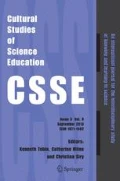Abstract
The 2008 commercial video game Spore allowed more than a million players to design their own life forms. Starting from single-celled organisms players played through a caricature of natural history. Press coverage of the game’s release offer two frames for thinking about the implications of the game. Some scientists and educators saw the game as a troubling teacher of intelligent design, while others suggested it might excite public interest in science. This paper explores the extent to which these two ways of thinking about the game are consistent with what players have done with the game in its online community. This analysis suggests that, at least for the players participating in this community, the game has not seduced them into believing in intelligent design. Instead the activities of these players suggest that the game has played a catalytic role in engaging the public with science. These findings indicate that designers of educational games may wish to consider more deeply tensions between prioritizing accuracy of content in educational games over player engagement.
Similar content being viewed by others
References
Bohannon, J. (2008). Flunking spore. Science, 322(5901), 531b. doi:10.1126/science.322.5901.531b.
Cavanagh, S. (2008, September 17). Game enables users to guide evolution on screen. Education week, pp. 12. Retrieved from http://www.edweek.org/ew/articles/2008/09/12/04spore.h28.html.
Crotty, M. M. J. (1998). The foundations of social research: Meaning and perspective in the research process. Australia: Allen & Unwin. Sage Publications.
DeVane, B., & Squire, K. (2008). The meaning of race and violence in Grand Theft Auto: San Andreas. Games and Culture, 3, 264–285. doi:10.1177/1555412008317308.
Duncan, S. (2008, March). Literacy implications of online fan debates. Paper presented at the Annual Meeting of the American Educational Research Association, New York, NY.
Gee, J. P. (2003). What video games have to teach us about learning and literacy. New York: Palgrave Macmillan.
Gee, J. P. (2004). Situated language and learning: A critique of traditional schooling. London, England: Routledge.
Geertz, C. (1975). The interpretation of cultures: Selected essays. London: Hutchinson.
Morris, S. (2003). Wads, bots, and mods: Multiplayer fps games as co-creative media. Paper presented at the Level up: Digital Games Research Conference. Utrecht, Netherlands: Universiteit Utrecht.
Owens, T. (2010). Modding the history of science: Values at play in modder discussions of Sid Meier’s Civilization. Simulation & Gaming, 42, 481–495. doi:10.1177/1046878110366277.
Phan, K. (2008). “Spore” game helps players understand intelligent design christianpost.com. Retrieved from http://www.christianpost.com/article/20080914/-spore-game-helps-players-understand-intelligent-design/index.html.
Robertson, M. (2008, September 8). The creation simulation. Seed. Retrieved from http://seedmagazine.com/news/2008/09/the_creation_simulation.php.
Schott, G. (2006). Agency in and around play. In D. Carr & D. Buckingham (Eds.), Computer games: Text narrative and play (pp. 133–148). Cambridge, UK: Polity.
Snider, M. (2008, September 8). ‘Spore’ creator inspired by intelligent design, social networks. USA Today. Retrieved June 9, 2009, from http://www.usatoday.com/tech/gaming/2008-09-08-spore_qa_N.htm.
Spore Game Helps Players Understand Intelligent Design (2008). Christianpost.com. URL: http://www.christianpost.com/article/20080914/-spore-game-helps-players-understand-intelligent-design/index.html.
Steinkuehler, C., & Chmiel, M. (2006). Fostering scientific habits of mind in the context of online play. In S. A. Barab, K. E. Hay, N. B. Songer, & D. T. Hickey (Eds.), Proceedings of the 7th International Conference on Learning Sciences (pp. 723–729). Mahwah, NJ: Erlbuam.
Zimmer, C. (2008, September 2). Gaming evolves. The New York Times, p. F1. Retrieved from http://www.nytimes.com/2008/09/02/science/02spor.html.
Author information
Authors and Affiliations
Corresponding author
Rights and permissions
About this article
Cite this article
Owens, T. Teaching intelligent design or sparking interest in science? What players do with Will Wright’s Spore. Cult Stud of Sci Educ 7, 857–868 (2012). https://doi.org/10.1007/s11422-012-9383-5
Received:
Accepted:
Published:
Issue Date:
DOI: https://doi.org/10.1007/s11422-012-9383-5




